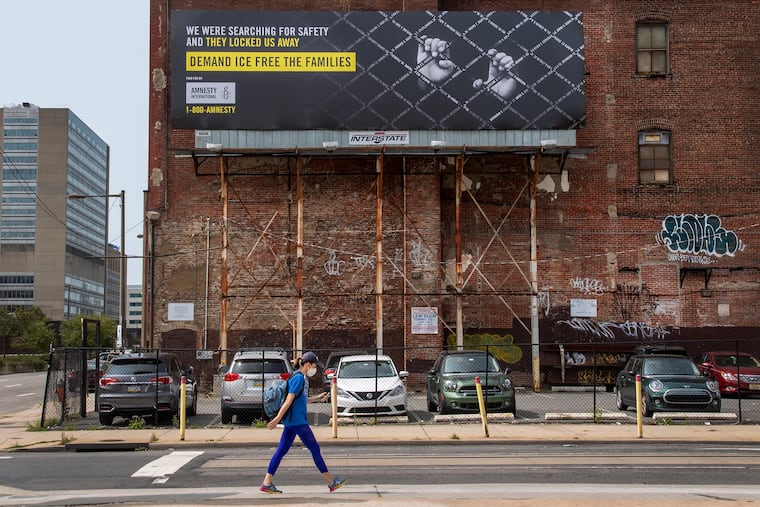Amnesty International billboards in Philly and other cities demand freedom for immigrant families in ICE custody
The billboard bears a stark, black-and-white image of a child’s hands clutching a chain-link fence, and the words, “We were searching for safety and they locked us away."

Billboards urging ICE to stop detaining immigrant families fleeing dangerous homelands and to free those already being held during the worst pandemic in a century have gone up in Philadelphia and other American cities.
Amnesty International USA erected the signs as part of a campaign, launched Tuesday morning, that urges federal immigration authorities to use their discretion and release both parents and children — an action they’ve long declined to take — and to end a crackdown on migrants seeking asylum in the United States.
The local billboard stands on the north side of the Vine Expressway near 12th Street, about seven blocks from the Philadelphia office of Immigration and Customs Enforcement. It bears a stark, black-and-white image of a child’s hands clutching a chain-link fence and the words “ ‘We were searching for safety and they locked us away.’ Demand ICE free the families.”
Each link of chain in the picture bears the names of immigrant children and parents being held at one of the nation’s three family detention centers, two of them in Texas and the third in Berks County, Pa.
The number of families detained at Berks can rise or fall dramatically depending on what occurs elsewhere in the immigration-enforcement system. Currently about eight families are being held at the center.
Other billboards were going up in Texas, Virginia, and the Washington, D.C., area, directed at both ICE and its parent agency, the Department of Homeland Security.
The federal government runs the largest immigration-detention system in the world, with ICE holding about 21,000 people in nearly 200 facilities across the country.
Asked about the billboards, an ICE spokesperson said Tuesday that the agency respects people’s rights to peacefully voice their opinions. The Berks center is a “safe and humane environment for families,” subject to inspections by the Pennsylvania Department of Human Services and compliant with federal laws, mandates, and court orders, the spokesperson said. No resident or staff member there has tested positive for COVID-19, he said, due to staff health-and-safety efforts to lessen the risk of exposure to the virus.
Amnesty spokesperson Mariya Parodi said the global human-rights advocate had several reasons for sending its message through an old-fashioned, low-tech medium.
Amnesty already reaches supporters via texts, websites, and emails, but “what we wanted to do with the billboards is also target the people responsible for these detention facilities offline. People like [acting Secretary of Homeland Security] Chad Wolf and [Senior Official Performing the Duties of the Director] Tony Pham,” Parodi said.
“In addition to targeting states that have detention centers, we wanted those responsible for them to be physically confronted near their homes, their families, and their communities.”
The Philadelphia ICE office ranks among the most aggressive in the nation, arresting more undocumented immigrants without criminal convictions than any of the 23 other offices, according to an investigation published in 2018 by The Inquirer and ProPublica. The agency’s North Eighth Street headquarters in Center City has been the regular site of protests and prayer vigils.
The office commonly handles the detention of families sent to the Berks lockup in Leesport, about 75 miles northwest of Philadelphia. Formally known as the Berks County Residential Center, the 96-bed facility has long been assailed by critics as a “baby jail” and has faced multiple lawsuits seeking its closure. Amnesty International has condemned Berks and similar facilities as inhumane and expensive, saying they “undermine our country’s long history as a beacon of hope for people seeking safety.”
Ciara Macmullen, a 16-year-old Amnesty activist who attends Owen J. Roberts High School in Pottstown, believes the billboards will make a difference.
“You can’t miss them,” she said. “The more people that see it, the more people take action. This puts more pressure on ICE to release these families. There’s nothing stopping ICE but their disregard for the health of asylum-seekers and refugees.”
During September and October, she and other Amnesty members intend to call, write letters, and email ICE offices, and to place yard signs in front of their homes to demonstrate solidarity with detained families.
The site of the Philadelphia billboard was chosen for its proximity to not only ICE but also to City Hall and historically important sites of freedom such as the Liberty Bell and Independence Hall.
Another billboard was placed in San Antonio, about a mile from the ICE office responsible for the families detained in the South Texas Residential Center in Dilley and about five miles from the Karnes County Residential Center in Karnes City. Those two facilities are much larger than Berks, and generally hold a few hundred parents and children.
Additional billboards have been posted on expressways leading to the Dilley and Karnes facilities. Trucks bearing artwork similar to the billboards are expected to soon drive past the White House, DHS and ICE headquarters, and the homes of Wolf and Pham.
During the coronavirus pandemic, the U.S. government has at times offered to release detained children — but generally not their parents, which advocates charge is merely a different form of family separation. Immigration authorities have the power to release both, and to monitor them while free, but have declined to do so.
“Kids belong with their families in safe homes and conditions, not locked away without their freedom for months or years on end, especially as a pandemic threatens their very lives,” said Denise Bell, who researches refugee and migrant rights at Amnesty International USA. “We’re using the tool we all have at our disposal: shining a light on this dangerous injustice and letting detained families know that we will not give up.”